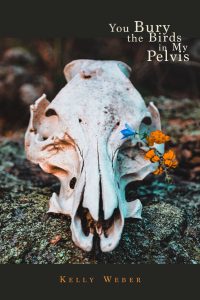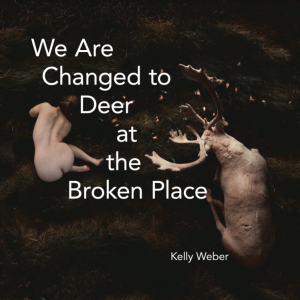Select Books:
You Bury the Birds in My Pelvis (Omnidawn Press – Winner of the Omnidawn 1st/Second Book Prize) is out now! Purchase it here!

Publisher’s description:
“Poems in a range of forms that consider the queer body, chronic illness, and love amid rural plains landscapes.
Set against a rural plains landscape of gas stations, wind, and roadkill bones littering the highways, You Bury the Birds in My Pelvis is a love letter to the nonbinary body as a site of both queer platonic intimacy and chronic illness. Looking at art and friendship, Kelly Weber’s poems imagine alternatives to x-rays, pathologizing medical settings, and other forms of harm. Considering the meeting place of radiological light and sunlit meadows, the asexual speaker’s body, and fox skeletons, these poems imagine possible forms of love. With the body caught in medical crisis and ecological catastrophe, Weber questions how to create a poetry fashioned both despite and out of endings.
You Bury the Birds in My Pelvis explores forms with plainspoken prose poems with a mix of short poems and longer lyric sections that navigate insurance systems and complicated rural relationships to queerness.”
Praise for You Bury the Birds in My Pelvis:
“A visceral exploration of chronic illness and asexuality….The rich stylistic palette (rhetorical questions, footnotes, second person, a call-and-response format) and sonic arsenal (alliteration, wordplay, anaphora) make for a courageous, unforgettable collection.”
—Shelf Awareness
“The speaker of these poems, sometimes with urgent pressured speech, sometimes with a cool remove, wants to tell us something. And we want to listen because what they say is like what we were just thinking. Or maybe like what we once thought. Once felt. Once did. Like that and yet different. This person’s way of being is inimitable. As is ours. Yet their words insist themselves into being something we were about to say. The words came out of their mouth and entered our language-primed minds by way of the eyes which read: ‘Each day / I negotiate another way to live.’ The associative leaps (circumstantially tangential) between being and becoming keep taking us to that place where: ‘The word queer / is barbwire strung across pink sky and snow, / larkspur and lupine rising from pelvis.’ Sometimes poems teach us how to be. Sometimes they simply let us be who we were all along. These poems brilliantly do both. I’m dazzled by the depths they reach. By the brightness of the language. The sharpness of the blade they use to carve a new world from the old.”
—Mary Jo Bang, “Judge’s citation”
“Modernity has degraded the ancient complexities of the erotic more deeply understood, not eros as servile to sexuality, but eros as the body’s ingathering of the world’s myriad vitalities—the same world which gathers our vital selves into it. In Weber’s You Bury the Birds in My Pelvis the privative prefix a- spreads wild is loosestrife wisdoms: asexual, aromantic. In the queerplatonic lyric consciousness of these poems praise becomes primary imperative. Praise of the other, praise of the all, praise of ‘every kind of sinful love /that’s love even without bodies conjoining.’ The hope isn’t to hack the body’s troubling facts, nor is it to resolve its mysteries into dogma; the hope is ‘to find the words for your queerness,’ for all of our queernesses, so that we can hear, as this poet hears, the finchsong found singing in the marrow. Here disease works its dithyramb through the nerves, but the admission of pain allows sorrows seldom shared to garland themselves into a form of grace we all, if we dare, can wear. ‘I’ve risked sharing my breath with you.’ Yes, it’s true: these poems inspire.”
—Dan Beachy-Quick, author of “Variations on Dawn and Dusk”
“Weber’s extraordinary work is a remarkable testament to the power of language and of vulnerability. Lush and sensual, You Bury the Birds in My Pelvis is an essential addition to aspec literature. Weber presents asexuality and queerness as a continual journey of exploration both of the self and of the self’s relationships to the body and to the wider community. It is particularly illuminating that this is a journey with ‘no easy articulation;’ rather, it is ‘always a poem in the gap between leap and arrival, exhale.’ In these luminous poems, Weber leads the reader to seek ‘permission for a more honest language’ to know themselves, celebrating the beauty of those who know themselves best in ‘a language made of everything that doesn’t fit.”
—Emma Bolden, author of “The Tiger and the Cage: A Memoir of a Body in Crisis”
Find this book on Goodreads
We Are Changed to Deer at the Broken Place (Tupelo, December 2022) is out now! (order here!)
We Are Changed to Deer at the Broken Place was one of SPD Books’ top ten bestselling poetry collections of December, 2022! (Details here)
Early praise for We Are Changed to Deer at the Broken Place:
“The irony of Kelly Weber’s brilliant first book of poetry is how sexy each sentence feels pressed to tongue. This is a book obsessed with sound, with the haunting creak of animals breaking through human bodies, canter and flight. Sex is everywhere in this book, and romance, too. And yet the lived experience Weber captures is Aroace Girl, aromantic and asexual, attached to the natural world but refusing expected couplings. She slithers, untethered; she claws, shoots, bleeds in a landscape described with such heartbreakingly beautiful precision that we’re forced to question what sex is, anyway. What is a body without another body pressed against it, inside it, stealing its dreams? Who is this Aroace Girl who stands so confidently in the sights of the hunter, knowing she doesn’t need anything in her mouth but words, anything between her legs but an arrow she shoots from her thighs? She’s magic. This book is stunning, like nothing else, and so sure of its experience that it won’t be bullied or twisted into submitting to norms: of hetero, of couple, of labor. Every poem feels original, unsettling, starkly refusing to bend to the cishet world’s will. I listened to the body in wonder. I let words escape me again and again.”
—Carol Guess, author of Girl Zoo and Doll Studies: Forensics
“The staggering beauty of these poems lies in their ability to re-envision what the body, & a life, might be capable of. Weber deftly transforms experience into landscapes that the speaker can daughter, even desperately, as sky or a deer or struck iron, to be visible. The poems give shape and form to the concerns of asexuality and aromanticism, ‘concluding asexuality is not a disorder / but a distinct orientation,’ as the speaker asks in different ways over the course of the collection, ‘how can I want / my skeleton to hold you / with softness I don’t have.’ The movement from ‘the entrance of the body’ to ‘beautiful’ might be perilous, yet it proves worthwhile, as is entering this stunning book, ‘headwatered in these bodies of ours,’ where to enter means to allow language to translate dying into living into ‘a river too full to contain all this sky.’”
—Chelsea Dingman, author of Through a Small Ghost and Thaw
Adopt my book for your course (with discussion prompts & writing exercises!)
Find my book on Goodreads
Ask your local library to order my book!
Select Reviews and Features about My Work:
Enjambments interview with Poets.Org and Literary Hub – You Bury the Birds in My Pelvis
Poets & Writers Page One: Where New and Noteworthy Books Begin – You Bury the Birds in My Pelvis
Shelf Awareness Review of You Bury the Birds in My Pelvis
Bookish Beck Blog Review of You Bury the Birds in My Pelvis
Lambda Literary: December’s Most Anticipated List – You Bury the Birds in My Pelvis
Philly Chapbook Review – You Bury the Birds in My Pelvis
Publishers Weekly feature on Omnidawn Press featuring You Bury the Birds in My Pelvis
Fall Reads: Recent CSU English Books – You Bury the Birds in My Pelvis
Select Poems:
Five poems in Waxwing
“Portrait of the Chest as Fogged Mirror and Ballpoint Tattoo,” AGNI
“Ode to His Knife Collection,” Nimrod Body Language Issue
“Explication of the Poet’s Breasts,” Gulf Coast Online
“Ars Poetica,” selected by Destiny O. Birdsong as the winner of the Baltimore Review Winter Prose Poem Contest
Two Poems, Electric Literature
Best American Poetry Poet Spotlight
“How to Draw Yourself as a Daughter,” Interim
“Blood Firsts” and “Snake Jawed Epithalamium,” Salamander #54
“Portrait as Mid-2000s Girl without a Boyfriend,” Foglifter
“Ode to the Drift Glass Necklace My Friend Gave Me,” Fourteen Poems
“We Are Changed to Deer at the Broken Place,” Pithead Chapel
“Jokes Only Asexuals Will Understand {Click Link to Open New Page},” finalist in the 2021 Frontier Open
“Omphalos : Heresy,” Pidgeonholes
“Conversion with Petrichor and this Clitoris,” Southeast Review
“Omphalos : Epoch,” Pacifica Literary Review
“Actaeon,” poem of the week at Missouri Review
Are Ace Girl’s Petition, perhappened
“Abstinence” and “Aroace Girl : Plainsong Elegy,” Tupelo Quarterly
“Traps,” “Queerplatonic,” Qu
Select Interviews and Recordings:
Omnidawn Fall ’23 Book Launch reading
Hundred Pitchers of Honey reading
Nebraska Friday Live August 2023 and January 2024 readings
Interview and Reading – In the Fire Garden
I know how to sever any angel from its vow: A Conversation with Kelly Weber about We Are Changed to Deer at the Broken Place — curated by Tiffany Troy – Tupelo Quarterly
An Interview with Kelly Weber, author of We Are Changed to Deer at the Broken Place – The Compulsive Reader
Sounds Fake But Okay Ep. 255: We Are Changed to Deer at the Broken Place Feat. Kelly Weber
A Conversation with Kelly Weber by C.E. Janecek discussing We Are Changed to Deer at the Broken Place
Poetry Mini Interview with Thomas Whyte
“Natural Juxtapositions,” Mud Season Review
Select Scholarship:
“‘We are the Poem’: Structural Fissures and Levels in Lidia Yuknavitch’s The Chronology of Water”, Assay: A Journal of Nonfiction Studies
Select Reviews by me:
Review of BODYELECTRONIC by Aerik Francis in Prairie Schooner
Review of Yearn by Rage Hezekiah in Colorado Review (Center for Literary Publishing)
Review of AUX ARC TRYPT ICH by Cody-Rose Clevidence, Denver Quarterly
Review of Kristin Bock’s Glass Bikini, Big Other
Review of Oscar Oswald’s Irredenta (Nightboat), EcoTheo
Review of Ghost Tracks by Sneha Subramanian Kanta (Louisiana Literature Journal and Press), Colorado Review
Review of What I Knew by Eleni Sikelianos (Nightboat), Seneca Review Fall 19, Volume 49, No. 2
Review of Hot With the Bad Things by Lucia LoTempio (Alice James), Colorado Review
Review of Ghost/Home, The Rumpus
Other Features:
